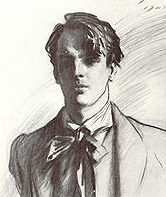
In Memory of Major Robert Gregory
by William Butler Yeats
I Now that we're almost settled in our house I'll name the friends that cannot sup with us Beside a fire of turf in th' ancient tower, And having talked to some late hour Climb up the narrow winding stair to bed: Discoverers of forgotten truth Or mere companions of my youth, All, all are in my thoughts to-night being dead. II Always we'd have the new friend meet the old And we are hurt if either friend seem cold, And there is salt to lengthen out the smart In the affections of our heart, And quarrels are blown up upon that head; But not a friend that I would bring This night can set us quarrelling, For all that come into my mind are dead. III Lionel Johnson comes the first to mind, That loved his learning better than mankind, Though courteous to the worst; much falling he Brooded upon sanctity Till all his Greek and Latin learning seemed A long blast upon the horn that brought A little nearer to his thought A measureless consummation that he dreamed. IV And that enquiring man John Synge comes next, That dying chose the living world for text And never could have rested in the tomb But that, long travelling, he had come Towards nightfall upon certain set apart In a most desolate stony place, Towards nightfall upon a race Passionate and simple like his heart. V And then I think of old George Pollexfen, In muscular youth well known to Mayo men For horsemanship at meets or at racecourses, That could have shown how pure-bred horses And solid men, for all their passion, live But as the outrageous stars incline By opposition, square and trine; Having grown sluggish and contemplative. VI They were my close companions many a year, A portion of my mind and life, as it were, And now their breathless faces seem to look Out of some old picture-book; I am accustomed to their lack of breath, But not that my dear friend's dear son, Our Sidney and our perfect man, Could share in that discourtesy of death. VII For all things the delighted eye now sees Were loved by him; the old storm-broken trees That cast their shadows upon road and bridge; The tower set on the stream's edge; The ford where drinking cattle make a stir Nightly, and startled by that sound The water-hen must change her ground; He might have been your heartiest welcomer. VIII When with the Galway foxhounds he would ride From Castle Taylor to the Roxborough side Or Esserkelly plain, few kept his pace; At Mooneen he had leaped a place So perilous that half the astonished meet Had shut their eyes; and where was it He rode a race without a bit? And yet his mind outran the horses' feet. IX We dreamed that a great painter had been born To cold Clare rock and Galway rock and thorn, To that stern colour and that delicate line That are our secret discipline Wherein the gazing heart doubles her might. Soldier, scholar, horseman, he, And yet he had the intensity To have published all to be a world's delight. X What other could so well have counselled us In all lovely intricacies of a house As he that practised or that understood All work in metal or in wood, In moulded plaster or in carven stone? Soldier, scholar, horseman, he, And all he did done perfectly As though he had but that one trade alone. XI Some burn damp faggots, others may consume The entire combustible world in one small room As though dried straw, and if we turn about The bare chimney is gone black out Because the work had finished in that flare. Soldier, scholar, horseman, he, As 'twere all life's epitome. What made us dream that he could comb grey hair? XII I had thought, seeing how bitter is that wind That shakes the shutter, to have brought to mind All those that manhood tried, or childhood loved Or boyish intellect approved, With some appropriate commentary on each; Until imagination brought A fitter welcome; but a thought Of that late death took all my heart for speech.
0
Create a library and add your favorite stories. Get started by clicking the "Add" button.
Add In Memory of Major Robert Gregory to your own personal library.
Add In Memory of Major Robert Gregory to your own personal library.
Return to the William Butler Yeats Home Page, or . . . Read the next poem; In Taras Halls









